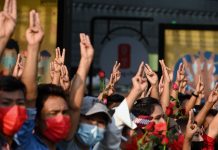
President Donald Trump announced that he signed the Hong Kong Autonomy Act into law as a response to China’s interference with Hong Kong’s autonomy.
Under the newly signed law, Chinese officials and companies that aided Beijing with imposing a national security law on Hong Kong to suppress dissent would face mandatory sanctions.
“Hong Kong will now be treated the same as mainland China,” Trump said during a speech in the White House Rose Garden.
“No special privileges, no special economic treatment and no export of sensitive technologies. In addition to that, as you know, we are placing massive tariffs and have placed very large tariffs on China.”
The Trump administration has been known for opposing Beijing’s national security legislation that tapers Hong Kong’s autonomy and prohibiting literature critical of the Chinese Communist Party.
Moreover, Trump also mentioned the executive order he signed to remove the preferential treatment that Hong Kong has long enjoyed.
Earlier in July, Secretary of State Mike Pompeo tagged the new law as an “Orwellian move” and a weapon against “the rights and freedoms of the people of Hong Kong.”
The national security law is considered the latest point of tension between the US and China. The US blamed China for the coronavirus pandemic and criticized the Chinese government for its territorial claims in the South China Sea.
Attacks against Biden
Trump’s speech in the Rose Garden also spewed out several attacks against his political rivals, particularly presumptive Democratic presidential nominee Joe Biden.
According to Trump, Biden’s “entire career has been a gift to the Chinese Communist Party,” and “it’s been devastating for the American worker.”
“Biden expressed more fawning praise about China on an ordinary day than about America,” Trump said. He noted that Biden recently remarked that the US has “never lived up to” its founding ideals.
Trump also criticized Biden’s stance on issues such as school choice, immigration, military funding, energy policy, among others.
“There’s never been a time when the two candidates were so different,” Trump stressed. Trump also announced that he will sign a “very powerful” merit-based immigration act but did not give further details.
US-China relations
According to Eurasia Group, US-China tension may escalate and may fight each other in many more ways.
“There’s a lot of room for escalation here. I think that it’s, by now, quite clear that we’re in for the darkest chapter yet of U.S.-China relations,” Todd Mariano, director for U.S. at Eurasia Group, said on CNBC’s “Squawk Box Asia."
“We’re seeing moves now more on the technology and export front. I think the troubling sign is simply the multiplicity of fronts at which the two countries are fighting or preparing to fight,” he said.
US-China tension is rooted in several areas, such as their trade imbalance and competition in technology. This sparked a tariff war that may damage the world economy.
The US-China conflict is a “lose-lose” situation for both sides, according to a political science professor from Harvard University.
“I think this will be worsening across the board and I hope that they don’t do any permanent damage,” said Graham Allison, Harvard’s Douglas Dillon professor of government. He served as assistant secretary of Defense under President Bill Clinton and special advisor to the secretary of Defense under President Ronald Reagan.
Allison pointed out that the US-China conflict could lead to the collapse of the phase one trade deal and resume with the blame game over the origins of the coronavirus.






